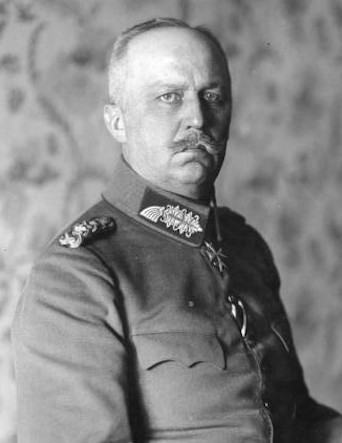Erich Ludendorff
 Erich Friedrich Wilhelm Ludendorff (; 9 April 1865 – 20 December 1937) was a Prussian-born German military officer and politician. He achieved fame during World War I for his central role in the German victories at Liège and Tannenberg in 1914. After his appointment as First Quartermaster General of the Army General Staff in 1916, he became the chief policymaker in a ''de facto'' military dictatorship until Germany's defeat. Later during the Weimar Republic, he took part in the failed 1920 Kapp Putsch and Hitler's 1923 Beer Hall Putsch, thereby contributing significantly to the Nazis' rise to power.
Erich Friedrich Wilhelm Ludendorff (; 9 April 1865 – 20 December 1937) was a Prussian-born German military officer and politician. He achieved fame during World War I for his central role in the German victories at Liège and Tannenberg in 1914. After his appointment as First Quartermaster General of the Army General Staff in 1916, he became the chief policymaker in a ''de facto'' military dictatorship until Germany's defeat. Later during the Weimar Republic, he took part in the failed 1920 Kapp Putsch and Hitler's 1923 Beer Hall Putsch, thereby contributing significantly to the Nazis' rise to power. Erich Ludendorff came from a family of minor nobility in Kruszewnia, in the Prussian Province of Posen. After completing his education as a cadet, he was commissioned a junior officer in 1885. In 1893, he was admitted to the prestigious German War Academy, and only a year later was recommended by its commandant to the General Staff Corps. By 1904, he had rapidly risen in rank to become a member of the Army's Great General Staff, where he oversaw the development of the Schlieffen Plan.
Despite being removed from the Great General Staff for meddling in politics, Ludendorff restored his standing in the army through his success as a commander in World War I. In August 1914, he led the successful German assault on Liège, earning him the Pour le Mérite. On the Eastern Front under the command of General Paul von Hindenburg, Ludendorff was instrumental in inflicting a series of crushing defeats against the Russians, including at Tannenberg and the Masurian Lakes.
By August 1916, Ludendorff had successfully lobbied for Hindenburg's appointment as Supreme Commander as well as his own promotion to First Quartermaster General. Once he and Hindenburg had established a ''de facto'' military dictatorship, Ludendorff directed Germany's entire military strategy and war effort until the end of the conflict. In this capacity, he secured Russia's defeat in the east and launched a new wave of offensives on the Western Front resulting in advances not seen since the war's outbreak. However, by late 1918, all improvements in Germany's fortunes were reversed after its forces' decisive defeat in the Second Battle of the Marne and the Allies' Hundred Days Offensive. Faced with the war effort's collapse and a growing popular revolution, Kaiser Wilhelm II forced Ludendorff to resign.
After the war, Ludendorff became a prominent nationalist leader and a promoter of the stab-in-the-back myth, which posited that Germany's defeat and the settlement reached at Versailles were the result of a treasonous conspiracy by Marxists, Freemasons and Jews. He also took part in the failed 1920 Kapp Putsch and 1923 Beer Hall Putsch before unsuccessfully standing in the 1925 election for president against Hindenburg, his wartime superior. Thereafter, he retired from politics and devoted his final years to the study of military theory. His most famous work in this field was ''The Total War'', where he argued that a nation's entire physical and moral resources should remain forever poised for mobilization because peace was merely an interval in a never-ending chain of wars. Following his death from liver cancer in Munich in 1937, Ludendorff was given—against his explicit wishes—a state funeral organized and attended by Hitler. Provided by Wikipedia
Showing 1 - 1
of 1
for search: 'Ludendorff, Erich,1865-1937.',
query time: 0.01s